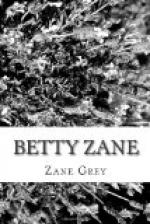A few words concerning Simon Girty, the White Savage. He had two brothers, James and George, who had been desperadoes before they were adopted by the Delawares, and who eventually became fierce and relentless savages. Simon had been captured at the same time as his brothers, but he did not at once fall under the influence of the unsettled, free-and-easy life of the Indians. It is probable that while in captivity he acquired the power of commanding the Indians’ interest and learned the secret of ruling them—two capabilities few white men ever possessed. It is certain that he, like the noted French-Canadian Joucaire, delighted to sit round the camp fires and to go into the council-lodge and talk to the assembled Indians.
At the outbreak of the revolution Girty was a commissioned officer of militia at Ft. Pitt. He deserted from the Fort, taking with him the Tories McKee and Elliott, and twelve soldiers, and these traitors spread as much terror among the Delaware Indians as they did among the whites. The Delawares had been one of the few peacefully disposed tribes. In order to get them to join their forces with Governor Hamilton, the British commander, Girty declared that Gen. Washington had been killed, that Congress had been dispersed, and that the British were winning all the battles.
Girty spoke most of the Indian languages, and Hamilton employed him to go among the different Indian tribes and incite them to greater hatred of the pioneers. This proved to be just the life that suited him. He soon rose to have a great and bad influence on all the tribes. He became noted for his assisting the Indians in marauds, for his midnight forays, for his scalpings, and his efforts to capture white women, and for his devilish cunning and cruelty.
For many years Girty was the Deathshead of the frontier. The mention of his name alone created terror in any household; in every pioneer’s cabin it made the children cry out in fear and paled the cheeks of the stoutest-hearted wife.
It is difficult to conceive of a white man’s being such a fiend in human guise. The only explanation that can be given is that renegades rage against the cause of their own blood with the fury of insanity rather than with the malignity of a naturally ferocious temper. In justice to Simon Girty it must be said that facts not known until his death showed he was not so cruel and base as believed; that some deeds of kindness were attributed to him; that he risked his life to save Kenton from the stake, and that many of the terrible crimes laid at his door were really committed by his savage brothers.
Isaac Zane suffered no annoyance at the hands of Cornplanter’s braves until the seventh day of his imprisonment. He saw no one except the squaw who brought him corn and meat. On that day two savages came for him and led him into the immense council-lodge of the Five Nations. Cornplanter sat between his right-hand chiefs, Big Tree and Half Town, and surrounded by the other chiefs of the tribes. An aged Indian stood in the center of the lodge and addressed the others. The listening savages sat immovable, their faces as cold and stern as stone masks. Apparently they did not heed the entrance of the prisoner.




